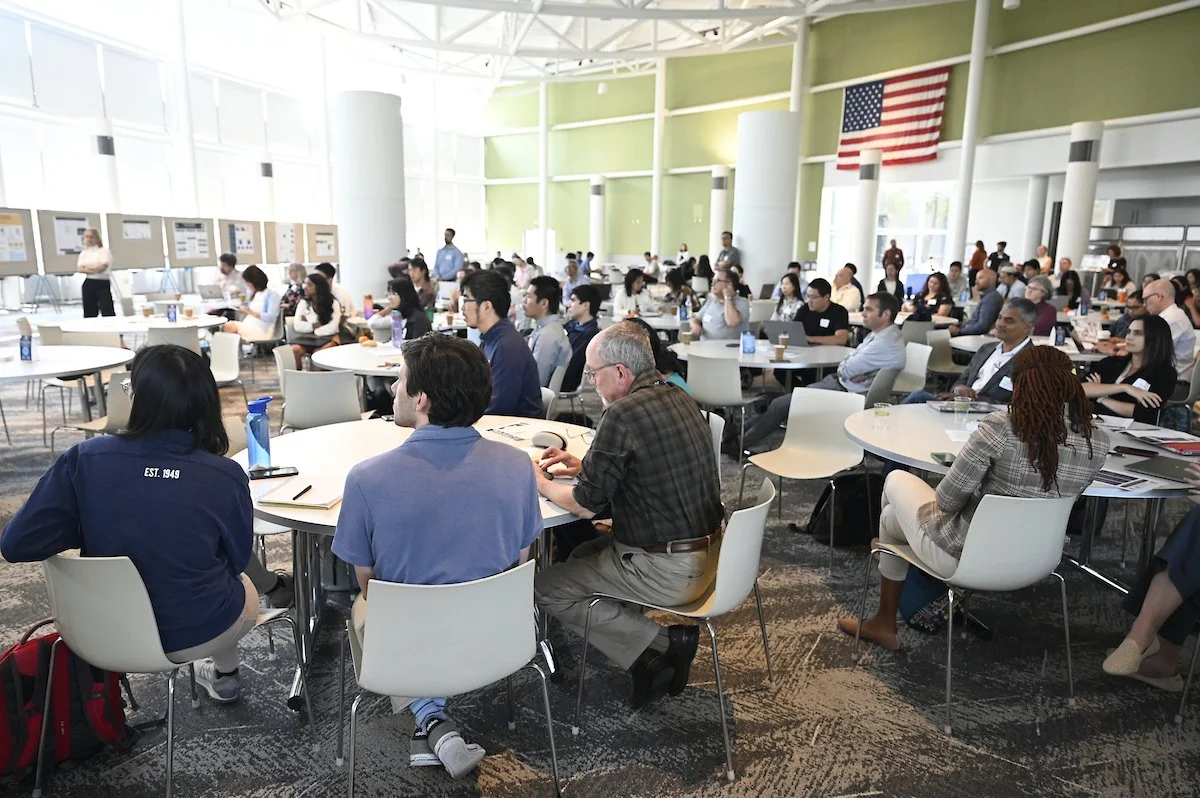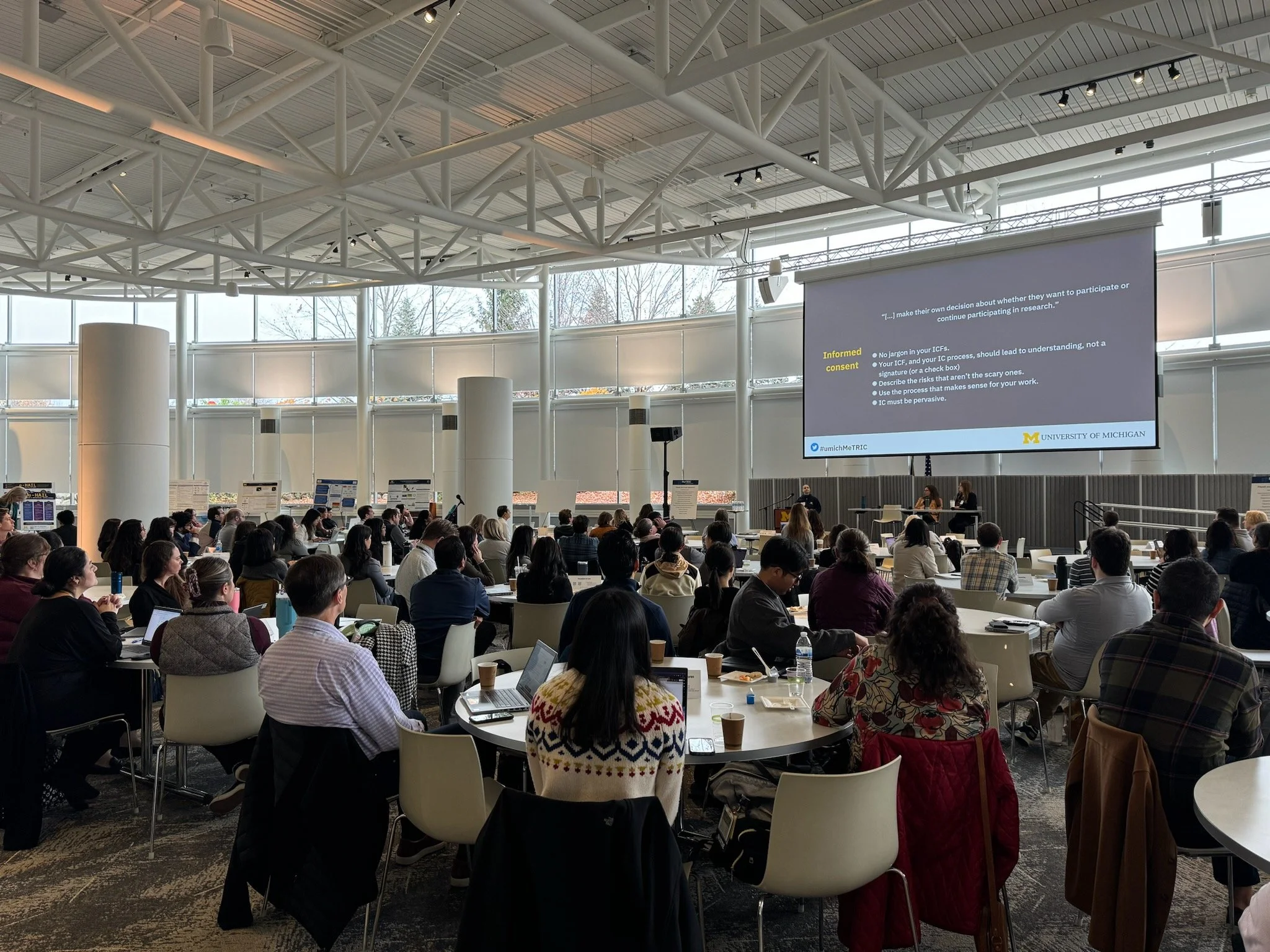
Community Partnerships
AI&DHI forges close partnerships with community collaborators who are at the forefront of digital and health AI research at U-M.
Together, we cultivate vibrant forums for exchanging ideas and resources, offer a range of valuable services, ignite innovation, and empower the development of impactful research proposals that advance the rapidly evolving fields of digital and health AI.
Michigan Genomics Initiative (MGI)
The Michigan Genomics Initiative (MGI) is a collaborative research effort among physicians, researchers, and patients at Michigan Medicine.
The MGI Community is an integral part of the MGI Initiative. Our community brings together like-minded researchers, interested in exploring the use of genetic data to improve health.
About the MGI Community
MGI is a community built around shared data and shared resources with focus on lowering the barriers of entry and allowing a wide range of researchers and clinicians to become involved in genetics research.
The goal of MGI is to enable the adoption of genetics understanding in clinical practice. This is is seen through:
High quality data preparation with extensive input by internationally recognized domain experts.
Centralized pre-analysis with domain expert input (Imputation, Star alleles)
Return of user-generated data.
Tools (Encore, Pheweb)& Computation infrastructure that iterates across projects.
Support of Analyses
MGI project (Return of Results)
Annual symposium with High Profile External Speaker. Here we learn about research using MGI, discuss the future goals for the data, and additional pre-analyses.
For more information, contact:
Sebastian Zoellner, PhD
Professor, Biostatistics Department
Professor, Psychiatry Department
Co-Director, AI & Digital Health Innovations
“The MGI Community is a great place to interact with U - M researchers who are interested in leveraging genetic data to advance digital health research. There is a wealth of knowledge, expertise, and a strong sense of community within the MGI Community – it’s really helped me as I think about my genetic research.”
Xiang Zhou, PhD
Professor, Biostatistics
e-Health and Artificial Intelligence (e-HAIL)
e-HAIL fosters a multi-disciplinary approach to innovations in healthcare and AI/machine learning (ML) methodologies.
e-HAIL’s focus is on fostering new multi-disciplinary collaborations between AI and Health experts, supporting grant development to secure extramural funding, and supporting researcher interaction.
About e-HAIL
The e-Health and Artificial Intelligence (e-HAIL) program is a joint effort with sponsorship from the Offices of Research in the College of Engineering and the Medical School. Connecting and supporting faculty dyads is at the core of our work. Our vision is to enable technological breakthroughs in core AI methodologies that have a positive impact on the health of individuals and populations, within healthcare systems and beyond, both in the US and globally.
e-HAIL is a supportive community of researchers that interacts regularly through online brainstorming sessions and in-person workshops. Topics are based on member interests, and range from feedback sessions to strengthen specific aims for upcoming grant applications to timely discussions of open problems in healthcare where new AI research has the potential to help.
For more information, contact:
Kelly Manthei, Program Manager, e-HAIL
“We could not have pulled off our recent projects without e-HAIL. Based on an initial conversation, e-HAIL’s program manager made the connection to colleagues in Engineering whose research interests were a good fit, and the collaboration has blossomed from there. e-HAIL’s grant writer has been part of all of our team meetings and his support has been absolutely amazing. Our progress so far has been really exciting!”
Devin McCaslin, PhD
Head and Neck Surgery, Michigan Medicine
Mobile Technologies Core (MTC)
MTC is the go-to hub for cutting-edge knowledge and mobile health technology collaboration at U-M.
The Mobile Technologies Core supports researchers with expert guidance and comprehensive resources for integrating wearables and mobile technologies into health, wellness, and human performance research—at every stage.
Peer-Reviewed Literature Searches: Discover curated and customizable literature searches, designed to help you quickly find clinical and technological research relevant to your project’s needs.
Code Repository: Explore reusable code developed for health research using the latest in mobile technology—perfect for jump-starting your next project.
Video Library: Learn from the best! Watch recorded talks by leading researchers, sharing insights and strategies for cutting-edge research using digital and mobile technologies.
Mobile Health Data Sets: Get your hands on unique research datasets collected from wearables and other mobile devices—an invaluable asset for data-driven discovery.
Discussion Forum: Join a dynamic Q&A forum where researchers interested in mental health and mobile tech share questions, solutions, and ideas.
Affinity Groups: Connect with specialized knowledge-sharing groups of U-M researchers and their teams who leverage mobile tech across a variety of disciplines.
U-M Remote and Mobile Technology Expertise: Easily search for and connect with U-M collaborators who have specialized skills and experience in mobile technology, opening doors to impactful partnerships.
Poster & Document Repository: Browse a rich database of posters, presentations, and scholarly works showcasing the innovation and achievements across the U-M mobile tech community.
About the Mobile Technology Core
Whether you’re exploring new data from wearables, interested in connecting with expert peers, or diving into peer-reviewed studies, we can help empower you to innovate, discover, and connect.
Our resources include:
Consultations: Receive personalized guidance tailored to your research questions—tap into the expertise of specialists who can help you navigate every aspect of research using digital tools and mobile devices. Get support for study design, methodology, data collection, and more—ensuring you have the resources you need to succeed.
Knowledge Base: Access a comprehensive collection of expert-written articles, best practices, step-by-step tutorials, and in-depth code documentation focused on mobile technology in research.
For more information, contact:
Victoria Bennett,
Mobile Technologies Core Manager
“Working across campus, we have sourced diverse and comprehensive expertise to reduce friction for investigators using mobile technologies in their research.”
Cathy Goldstein, M.D.
MeTRIC & Mobile Technologies Core Faculty Lead
Michigan Medicine



